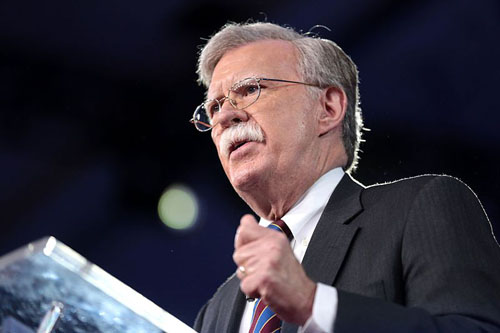by WorldTribune Staff, August 30, 2019
The United States should look to work through “significant issues” in its relationships with Belarus and engage in dialogue about common interests, U.S. national security adviser John Bolton said during a brief visit to the eastern European nation’s capital.

Bolton’s visit to Minsk was the highest-level U.S. government trip to Belarus in two decades and was part of a regional tour of countries that Russian President Vladimir Putin sees as part of the former Soviet Union’s sphere of influence. Earlier on Aug. 29, Bolton was in Moldova, and before that he spent several days in another former Soviet republic, Ukraine.
Earlier in the day, Lukashenka warmly greeted Bolton, saying that he is looking to open a “new chapter” in relations between Minsk and Washington, RFE/RL reported.
“Since the start of the deterioration of our relations with the United States, we have constantly proposed turning this bad page,” he said.
The Belarusian leader, often described as “the last dictator in Europe,” added that Bolton’s visit would help “create the foundation for future relations” and that he hoped for “frank” discussions on “all issues.”
Speaking at a Minsk airport before departing Minsk, Bolton told RFE/RL that his talks with Lukashenka “unexpectedly” lasted more than two hours and covered “a lot of ground,” including human rights.
“We didn’t resolve any issues — certainly, I didn’t come into the conversation with the expectation that we would — but I thought it was a fascinating conversation,” Bolton said.
In an Aug. 29 interview with the Russian-language network Current Time, Bolton said “the geostrategic environment in this part of Europe” and “global threats” should “at least cause us to have a conversation about where Belarus’s interests and the interests of the United States coincide.”
Belarus, which has been under Lukashenka’s rule for a quarter of a century, was sanctioned by the United States and the European Union in the wake of a crackdown that followed the 2006 presidential election.
The sanctions prompted Belarus to recall its ambassador from the United States in 2008 and the U.S. ambassador in Minsk left the country shortly afterward.
“I think we are going to talk about the range of sanctions that have been applied to Belarus because of human rights concerns, nonproliferation concerns, and others,” Bolton told RFE/RL. “And we’ll see if we can work our way through those issues. I think it will be an important, difficult conversation, but it’s one that’s worth having.”
Bolton also addressed Belarus’s sovereignty in light of Minsk’s relations with Moscow, saying: “What the people of Belarus want really should determine what their relationship with Russia is.”
Belarus is a member of the Eurasian Economic Union and the Collective Security Treaty Organization, regional groupings that observers say Moscow uses to bolster its influence in the former Soviet Union and to counter the European Union and NATO.
In Minsk, Bolton visited the Yama (the Pit) memorial where more than 5,000 people from the city’s Jewish ghetto who were killed on March 2, 1942.
In the interview led by Radio Free Europe/Radio Liberty (RFE/RL) in cooperation with VOA, Bolton said he had told Belarussian President Alyaksandr Lukashenka and other officials that “there are significant issues in the bilateral relationship involving human rights and nonproliferation. We are going to have to work through these other issues.”
Moscow has also voiced interest in pursuing a Russia-Belarus Union State, a project that has remained dormant for the past 20 years, the RFE/RL report noted.
Intelligence Brief __________ Replace The Media
